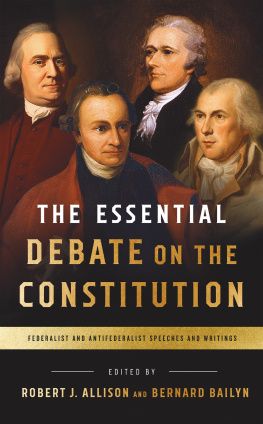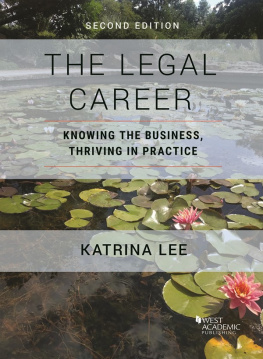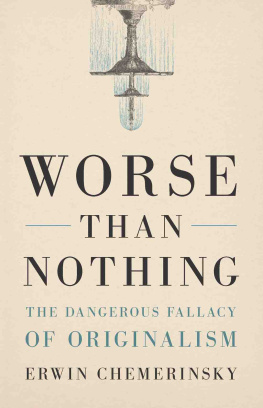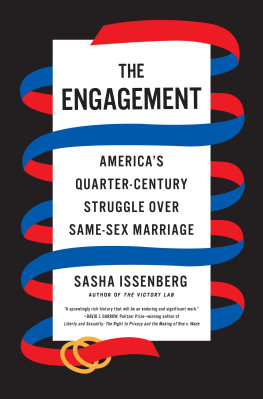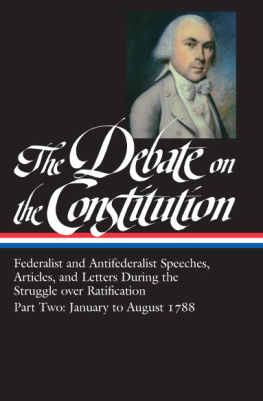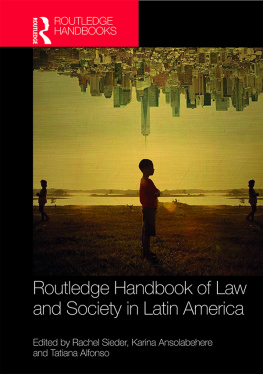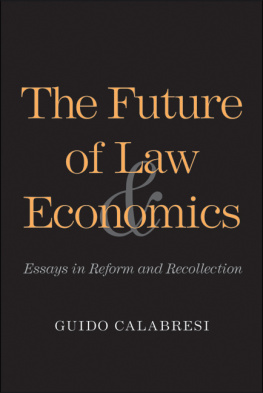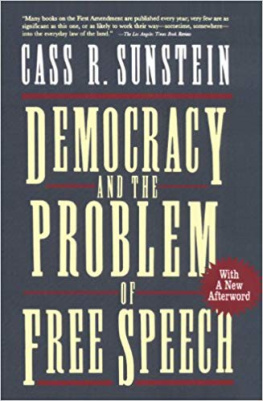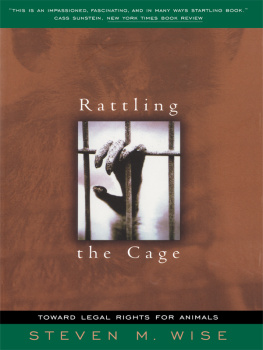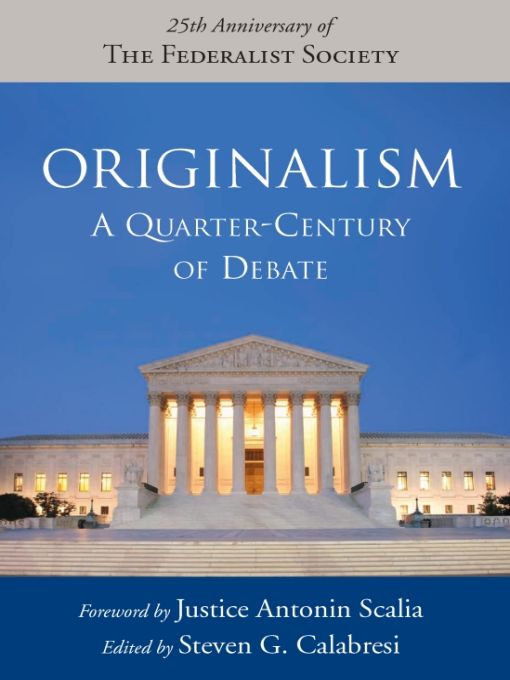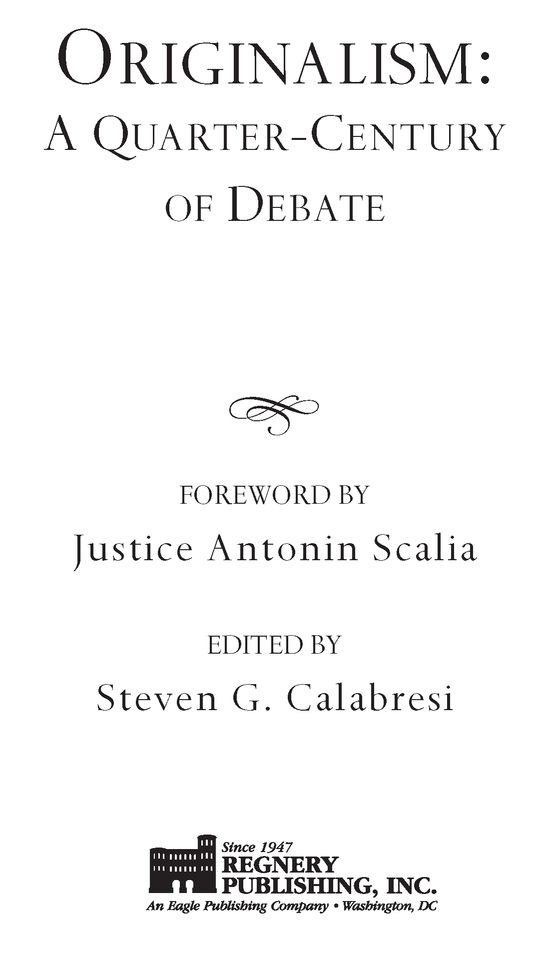Table of Contents
To Mimi
Introduction
A CRITICAL INTRODUCTION TO THE ORIGINALISM DEBATE
by Steven G. Calabresi
This book commemorates the twenty-fifth anniversary of the founding of the Federalist Society in 1982. For the last quarter century, the Society and many of its members have promoted originalism as the correct philosophy to use in interpreting the Constitution. The originalism debate is of central importance to the Federalist Societys mission of promoting the rule of law, constitutionally limited government, and the separation of powers. We believe that ours should be a government of laws and not one of men or of judges.
Over the last quarter century, originalism has been the subject of much discussion. That debate, which had been proceeding quietly in American law schools, burst into noisy and public view with a speech by then-attorney general Edwin Meese, III, to the American Bar Association on July 9, 1985, which called for a Jurisprudence of Original Intention. Leading Supreme Court Justice William J. Brennan, Jr., entered the fray as did many other famous judges and law professors. General Meese honored the Federalist Society by delivering his response to Justice Brennan in November 1985 to the Federalist Societys Lawyers Division. We think this response and a speech that General Meese gave a year later at Tulane University remain among the most enduring statements of the originalist creed.
For that reason, we published a booklet in 1986 entitled The Great Debate that contained the key contributions to the originalism debate at that time. We continue to think that the originalism debate is of central importance to the Federalist Societys mission. We therefore chose to celebrate the twentieth anniversary of General Meeses speech to our Lawyers Division by making originalism the theme of our 2005 National Lawyers Division Convention. With this book, we are now publishing the most important speeches that were given in the Meese-Brennan debate more than twenty years ago and portions of the twenty-year retrospective conference we held in November 2005. This book then contains a quarter-century of writings for and against originalism.
The speeches from our conference show that the issues General Meese raised more than twenty years ago are timeless and are still hotly contested. President George W. Bushs recent appointments of Reagan administration alumni John Roberts to be Chief Justice of the United States and of Samuel Alito to be an Associate Justice have led many Federalists to hope that there may now be four justices sympathetic to originalism on the Supreme Court. Six of the nine current justices are over the age of sixty-five, which used to be the mandatory retirement age in private business. It seems likely therefore that there will be several Supreme Court vacancies in the next six years. This book addresses the question of what judicial philosophy we should look for in picking new members of the Supreme Court. The reader will find in these pages the best and most brilliant defenders and opponents of the originalist creed. We hope this book will inform and shape the ongoing great debate over the merits of constitutional originalism.
The publication of this book comes at a time when three other brilliant originalist books have just been published: Mr. Meeses own Heritage Guide to the Constitution; Akhil Reed Amars Americas Constitution; and Randy Barnetts Restoring the Lost Constitution. Strikingly, the Meese and Amar books both go through the Constitution clause by clause from the Preamble to the Twenty-Seventh Amendment. The Barnett book offers a general originalist theory of constitutional law, which is sound on constitutional theory and enumerated powers, but faulty as to the Fourteenth Amendment. We think this flurry of originalist writing shows the continuing hold that the originalism debate has on the public mind even after a quarter-century.
In the remainder of this introduction, I want to give the reader a critical and opinionated guide to the ideas raised by some of the sources that follow. I will begin with a critical discussion of General Meeses speech to the ABA on July 9, 1985, and will end by very briefly discussing each of the panels and debates reprinted here from our 2005 Lawyers Conference. For each item I discuss, I will offer my own opinionated reading of the texts.
ATTORNEY GENERAL MEESES 1985 SPEECH TO THE ABA
The first theme of General Meeses 1985 ABA speech is the primacy of the rule of law. General Meese begins by saying we Americans pride ourselves on having produced the greatest political wonder of the worlda government of laws and not of men. He goes on to quote Thomas Paine as saying, America has no monarch: Here the law is king. This emphasis on the rule of law is central to originalism. Originalists believe that the written Constitution is our fundamental law and that it binds all of useven Supreme Court justices. Those justices who abandon the original meaning of the text of the Constitution invariably end up substituting their own political philosophies for those of the framers. We Americans have to decide whether we want a government of laws or one of judges. Is the constitutional text going to bind the Supreme Court, or will the justices in essence write and rewrite the text? General Meeses ABA speech comes down squarely in favor of the idea that the Constitution is a limitation on judicial power as well as executive and legislative power.
The argument for the rule of law is in part that the alternative is to give judges too much discretion, which would produce big swings in constitutional law that would be destabilizing and undemocratic. But there is much more to it than that. There is, in addition, the idea that courts and judges should be able to avoid the charge of being either too conservative or too liberal. There is no liberal or conservative meaning of the text of the Constitution; there is only a right meaning and a wrong meaning. Those who convert the Constitution into a license for judges to make policy instead of being a limit on the power of judges pervert a document that is supposed to limit power into one that sanctions it. For this reason, General Meese rightly says that a constitution that is viewed as only what the judges say it is no longer is a constitution in the true sense.
This leads to a second theme of General Meeses ABA speech, which is that the whole idea of constitutionally limited government itself is at stake in the originalism debate. If the original meaning of the text of the Constitution does not bind the Supreme Court, why should it bind the president or the chairman of the joint chiefs of staff? Once we abandon originalism in the Supreme Court why not abandon it everywhere else as well? Such a decision is perverse because, as General Meese points out, judges and Supreme Court justices were supposed to be the bulwarks of a limited constitution and not a French Revolutionary-style Committee of Public Safety that would legislate on the most sensitive issues of morality and religion by five-to-four votes without the limitations imposed on the legislature of bicameralism and presentment. Indeed, the only reason judges have power to hold laws unconstitutional is because the Constitution is a higher law that binds legislative and executive officials and that trumps unconstitutional actions those officials might take. But if the Constitution does not bind the justices, why should it bind the president or Congress? Accordingly, abandoning originalism means abandoning the rationale which


